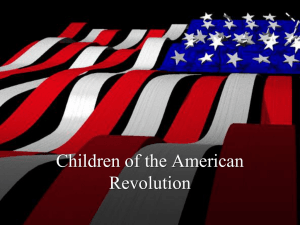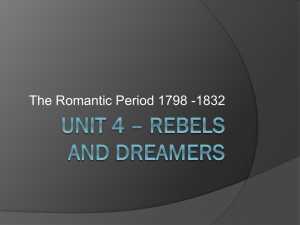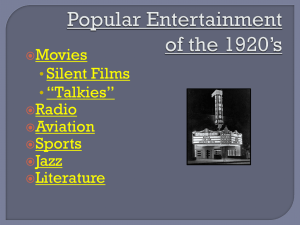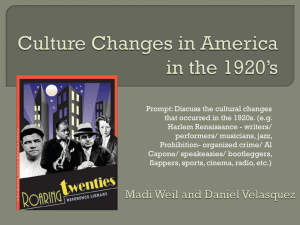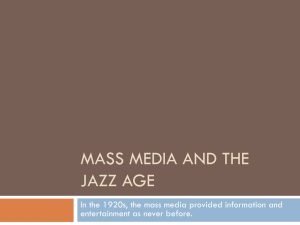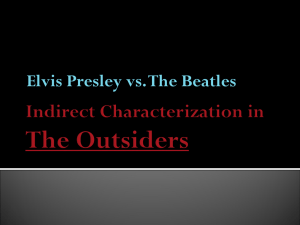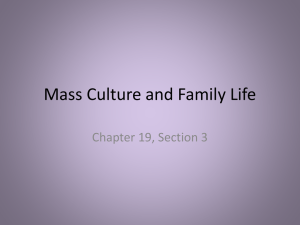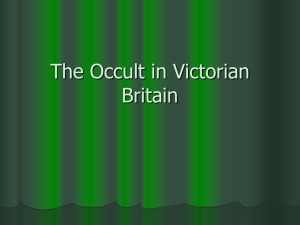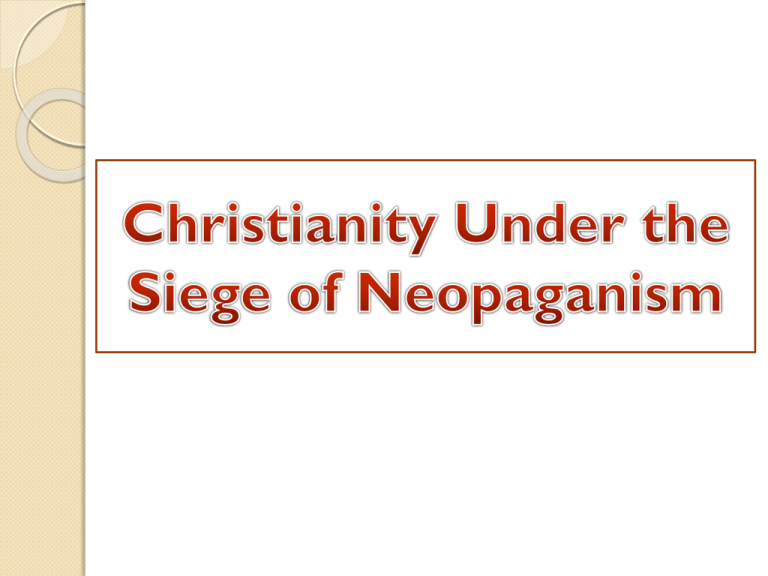
Four myths Evangelicals love
Myth # 1: Music is neutral and amoral
Myth # 2: Movies, video games, and
entertainment in general, do not affect
Christians too much.
Myth # 3: Pop culture cannot be avoided in
personal and church life
Myth # 4: Successful evangelism today
requires the accommodation of the nonbelievers in the church at the expense of
holiness and biblical standards
Why are these myths
embraced today?
We have to look at the last century of
historical developments, which changed
the Western world from a Christian
society into a neopagan, post-Christian
culture.
The
and the
were the most
significant events that changed the church
for the worst.
3
• The Roaring Twenties was the decade
(1920-1930) in America when late
teenage girls and young ladies rebelled
against Christian morals.
They shamelessly adopted immodest
dressing, started smoking and drinking
in public places, using cocaine, and
committing acts of immorality.
• The Hippie Revolution was the final
act of the Roaring Twenties against
Christianity, where many young
people rebelled not only against
Christian morals but also Christian
dogma, adopting Eastern Religions
such as Hinduism, Buddhism, and
New Age.
The
Hippie Revolution succeeded to
permeate the church, causing most of the
churches in the United States to adopt
neopaganism in the area of clothing,
music, and lifestyle.
In the following presentation we will
investigate how things went wrong with
the church at large, and what can be
done about it.
What led to the Roaring Twenties
in America?
There were several factors, among which the
following are the most important:
1. The influence of the secular, libertine, French
society upon the Americans (especially young
nurses) while they were fighting WWI in
Europe.
2. Sudden economical prosperity, and the rise to
prominence as a world power by winning WWI.
3. Self-confidence and pride among the average
citizen due to technological and economical
advances.
Why did France become the center of
immorality and libertinism in Europe?
The simple and clear answer is the French Revolution.
The French Revolution of 1792 was the first anti-Christian
revolution in the Church history.
The French Revolution was a pre-meditated genocide against
priests and devout Christians. At least 40,000 people were killed
by beheading, torture and other gruesome means. French
Revolution details
The Russian Bolshevik Revolution of 1917 took all the clues
from the French Revolution.
The French Revolution, in a few years, changed France from a
Christian nation to a secular, libertine and immoral one.
Who were the main actors of the French
Revolution?
There are two groups of people who made possible this
ghastly event: the preparers and the revolutionaries. The
preparers were Encyclopedists and philosophers. The
revolutionaries were the actual players in the uprising. Most of
the Encyclopedists lived much earlier than the French
Revolution time.
1. J.J Rousseau was a philosopher. He was a prideful,
rebellious anarchist who wrecked his life. He had children
with a servant, and later he committed his offsprings to the
orphanage. Afterwards, he had the audacity to write a book
titled Emil, in which he counseled people how to raise their
children.
Jean Jacques Rousseau
(1712-1778)
Source: Rousseau
Who were the main actors of the French
Revolution?
2. D. Diderot lived a promiscuous life in his youth. He
was an atheist philosopher and general editor for a huge
science dictionary called the Encyclopedia. Through his
work, Diderot facilitated for all Christianity haters of his
era to make their voices heard. He created an antiChristian opinion in France.
3.Voltaire was an atheist philosopher, one of the most
arrogant men who ever lived. He was an archenemy of
Christianity. He constantly battled the Christian faith.
Denis Diderot
(1713 –1784)
Source: Diderot
Voltaire
(1694 –1778)
Source: Voltaire
Who were the main actors of the French
Revolution?
For our purpose here, we will mention only two
people who took active part in the revolution, but
who are representatives of the character of the
revolution:
1. Maximilien Robespierre
2. Marquis de Sade
Maximilien Robespierre was a fanatic and a merciless
criminal, the head of the French Revolution. He
condemned numberless people to death, and then he
himself was beheaded by his comrades.
Maximilien Robespierre
(1758–1794)
Robespierre’s beheading -1794
Who were the main actors of the French
Revolution?
Marquis de Sade has been viewed as the greatest
incarnation of evil that ever lived. Despite his noble
birth, he supported the French Revolution, which he
saw as representing political liberation on a level
parallel to the sexual liberation he himself
represented. He was a sexual pervert who wrote
pornographic narratives, and who tortured his
prostitutes. The term sadistic/sadism is derived from
his name.
He was the forefather of the sexual revolution.
Marquis de Sade
(1740–1814)
A woman was enthroned as
the goddess of reason, instead of God,
in the Notre Dame Cathedral, Paris
during the French Revolution
The French Revolution Exposed
For centuries, the French society and atheist
or ignorant professors of history throughout
the world, affirmed the French Revolution as
a very positive development.
Yet in the last few years, the truth came to
light through the work of an eminent
historian, Pierre Chaunu, who along with
other co-authors documented the genocide,
tortures, rapes, and sadistic murders
committed by the French revolutionaries.
The Black
Book of the
French
Revolution
by Pierre Chaunu,
Emeritus professor of
history at Sorbonne
University.
WWI
WWI was a turning point for the history of the United States.
The nation came out a winner as a world powers
WWI
WWI
WWI
Although America came out as a victor in
war, and as an industrial power in the
post-war era, from the point of view of
Christianity and morals, it was the
beginning of the end.
The American nurses who accompanied
the troops in Europe, adopted loose
morals and immodest clothing from
France, when they made it back home.
American Nurses in France WWI
The French fashion in America
As a result of the French Revolution, over
time France became the leading nation in
Europe for immodest fashion, and loose social
life.
Two of the prominent French fashion
designers who wrongfully influenced America
after WWI were:
1. Gabrielle Bonheur “Coco” Chanel
2. Paul Poiret
Gabrielle Bonheur “Coco” Chanel
(1883-1971)
Paul Poiret – French fashion designer
(1879-1944)
The 1920 decade and accelerated
economical growth
The 1920s are known as the Coolidge years,
after the name of John Calvin Coolidge, 30th
president of the United States.
During his presidency, he restricted the
involvement of government in general in the
economy, promoting Laissez-faire (leave it
alone) economical policies.
America became a materialistic and
consumerist society, open to sin.
Technological innovations were also present.
Industrial Boom 1920s
Ford T-Model and Henry Ford 1920s
GE stove 1920s
Technology of the 1920s facilitating the spread
of sin. The phonograph brought
Jazz in American homes
The radio was also used for Jazz to gain
popularity
1920s
Architecture
Building in
Portland, OR
1920s
Architecture
Building in
Chicago, IL
Freud the occult sexual maniac
Sigmund Freud can be named the father of the sexual
revolution. He is directly responsible for the downfall
of the American society in the 1920s.
Freud was obsessed with sex, and he came up with
psychological constructs that encouraged immorality.
His views were widely accepted because the world
was waiting for a “scientific” excuse to openly
commit sexual sins.
His “inspiration” came from an avid study of false
religions, although he was an atheist. As an occultist,
he was addicted to collecting religious statues from
all over the world.
Freud the occult sexual maniac
His perversions such as: all people have
incestuous desires, or controlling sexual drives
is detrimental for your psyche, gained wide
acceptance first in Europe and then in
America.
When the promiscuity of the 1920s burst
out, especially among teenage young ladies,
Freudian aberrations were already part of
the common culture of the day. The result
was a new breed of young ladies called
flappers.
Sigmund
Freud
(1856 -1939)
Sigmund Freud’s desk full of idols
The third Great Awakening
Decades before the French immodesty
and Freudian ideas made it to the U.S.,
the nation experienced the third Great
Awakening, especially through the
preaching of D.L. Moody and the singing
of Ira Sankey.
The American society at large was very
conservative and the Victorian fashion
was the norm.
Fashion before the 1920s
Moody and evangelistic crusades
It is crucially important to notice in this presentation
the fact that big crusades were not started by Billy
Graham and Greg Laurie.
D.L. Moody had 20,000 people in the audience for his
crusades.
Although he was totally for the success of the
evangelistic campaign, he never employed ragtime
music (the pre-jazz genre) as a way to attract nonbelievers. Ragtime music was very popular for
saloons, parties, and dancing at that time.
Today, evangelical crusades and churches
indiscriminately use rock music to attract crowds. The
result is worldliness and apostasy in the church, as we
shall see later.
D.L. Moody
(1837-1899)
Moody’s crusade in Chicago
FLAPPERS
As we saw, Freudian
ideas coupled with
immodest French fashion
trends, brought about the
new class of young ladies
called flappers.
They were brazen sinners,
living just for parties and
even committing acts of
immorality in cars.
Fashion of the 1920s
Flapper 1920s
Flapper 1920s
Speakeasy 1920s
A speakeasy was an illegal
place for drinking alcohol,
because during 1920-1933
the U.S. government
implemented an alcohol
prohibition law known as The
Noble Experiment.
Flappers were always present
in speakeasies.
Jazz its Western African roots
Jazz is closely related to Ragtime music.
Both styles have Western African roots. It is
syncopated music. In the 1800s, America
experienced a great influx of slaves imported
from Western Africa who brought with them
their ritualistic, religious voodoo music,
syncopated in nature.
Brothels and saloons employed Ragtime and
Jazz music with these occult origins.
Jazz took over America, but it did not
penetrate the church back then.
Syncopation does not occur often in music, but,
when it becomes predominant, as in Jazz, Pop,
and Rock, it destroys the music and creates an
addictive, evil genre
"Syncopation is, very simply, a deliberate disruption of the two- or three- beat
stress pattern, most often by stressing an off-beat, or a note that is not on the
beat.”
Syncopation is a general term for a disturbance or interruption of the regular flow
of rhythm; a placement of rhythmic stresses or accents where they wouldn't
normally occur.
Syncopation is used in many musical styles, and is fundamental in such styles as
funk, ska, reggae, ragtime, rap, jump blues, progressive electronic dance music
progressive rock, jazz, breakbeat and dubstep. "All dance music makes use of
[syncopation] and it's often a vital element that helps tie the whole track
together".
In the form of a back beat, syncopation is used in virtually all contemporary
popular music.
52
Jazz band 1920s
Debauchery 1920s
Jazz and an expert evaluation of the time
Anne Shaw Faulkner, National Music Chairman of the General Federation
of Women's Clubs wrote:
"Does Jazz put the Sin in Syncopation?" Published in Ladies' Home
Journal in 1921, the article soundly condemned jazz music as
"an unmitigated cacophony, a combination of disagreeable sounds in
complicated discords, a willful ugliness and a deliberate vulgarity."
She continued,
“America is facing a most serious situation regarding its popular
music. Welfare workers tell us that never in the history of our land have there
been such immoral conditions among our young people, and in the surveys
made by many organizations regarding these conditions, the blame is laid on
jazz music … Never before have such outrageous dances been permitted in
private as well as public ballrooms, and never has there been used for the
accompaniment of the dance such a strange combination of tone and rhythm
as that produced by the dance orchestras of today.” Jazz Age website
Jazz, Charleston and Swing
Jazz is a music that creates superficiality, the urge for
parties and lewdness.
Jazz music produced different sexy dances like the
Charleston, Foxtrot, and Swing. The flappers used
their short skirts as an occasion to show more skin
and be more provoking when they danced Charleston
or Swing. Flappers who liked syncopated music and
dancing were known as Jazz Babies.
In the 1920s, America experienced a dance craze,
which alone proves the depths of the social decay.
Sometimes they held dance contests, where couples
would go dancing from one city to another.
Flappers dancing 1920s
The Great Depression & Great Drought
God put a temporary end to the sin, materialism, and
consumerism of America by bringing about the Great
Depression, followed by a great drought.
Historians most often attribute the start of the Great
Depression to the sudden and total collapse of the
U.S. stock market prices on October 29, 1929, known
as Black Tuesday.
In one day, the luxuries, brazen sin, dances, and
material commodities were gone. The flappers and
their partners became beggars at the soup kitchens.
The Great Depression 1930s
The Great Depression 1930s
Soup Kitchen 1930s
The Great Drought or the Dust Bowl
of the 1930s
Dust storm 1930s in Texas
The glamour is gone 1930s
WWII and the Aftermath
WWII was the event that brought America
to supremacy economically, politically, and
militarily.
Many people who went through the Great
Depression were also fighting in WWII.
Although they experienced the greatest
challenges of their lives, they did not
renounce the sins of the 1920s.
People who made it back from war gave
birth to a new generation of spoiled,
arrogant children called the “Baby Boomers”.
WWII
WWII
WWII
D-Day WWII
The 1950s
The 1950 decade was identical with the 1920s in
many respects. Both decades followed the world
wars. Both eras were marked by rapid scientific and
industrial growth. The youth rebelled both times.
Back in the 20s, the radio was the main attraction. In
the 50s, television took over the family. The roles of
the mother and father were substituted by the TV
programs.
The 50s was a time of population growth called the
“Baby Boomers ”era. Families had between 5 and 8
kids.
The 1950s
During the 50s, children received excessive
food, clothing and toys, because their parents
experienced the Great Depression and war,
and vowed that their children will not face
the same predicament.
The result was a class of people saturated
with goods, who sought to experience
anything else but what their parents offered
them. First they turned to the sexy R&B
music and the frenzy rhythm of Elvis Presley.
Later they forged their own identity as the
Hippie Movement.
R&B Music
R&B was developed by the mass migration
of African Americans during World War II.
They were singing about their past
experiences which was bound to be quite
"blue".
In its beginnings, R&B was based on gospel
and blues. Then in the 50's, a "doo-wop" vibe
was introduced into R&B songs, perverting
the music and most often making it sexy and
rebellious.
R&B music prepared the way for other
forms of Rock and occult music
James Brown- R&B singer
(1933 –2006)
Little Richard- R&B singer
(1932-present)
1950s prosperity
1950s family car
The source of sin for America
and the world
Movies 1950s
Parties 1950s
Marilyn Monroe
(1926 –1962)
the female sex symbol of the 50s and the one who boosted the
pornographic industry
Jazz band 1950s
Music 1950s
Glued to the TV 1950s
This book
reveals the truth
about the occult
origins of Rock
music by a
foremost
authority on the
subject,
R. Gary
Patterson.
The Satanic nature of Rock music
Author Gary Patterson, a non-christian
critique of rock music, fully provides factual
information about how Robert Johnson, the
grandfather of Rock music made a vow to
Satan, to enable him to become a guitar
celebrity.
Robert Johnson’s example was followed by
many bands such as Led Zeppelin and the
Rolling Stones.
The Satanist roots of Rock music are found
in its Western African, occult, ritualistic,
syncopated rhythm.
Robert Johnson, the grandfather of rock music –
devil’s musician
(1911-1938)
Robert Johnson
Many of Robert Johnson’s songs are about
the Devil.
1. Me and the Devil Blues
2. Hellhound on my Trail
3. Preaching Blues (Up Jumped the Devil)
Elvis Presley, Led Zeppelin, and Rolling
Stones all revered Robert Johnson and
claimed him as their inspiration.
Elvis Presley
(1935–1977)
youth are mesmerized
Elvis the belly dancer
Elvis Presley
Elvis Presley was not just a singer, but a phenomenon.
He changed the culture of America and the world for
the worst. Elvis was the white man with a black heart,
meaning he had the ethos of a black man.
He was totally familiar with the black culture as he
lived in Mississippi and Memphis, Tennessee.
He promoted what was bad from the black culture.
On the other hand, there is a whole array of Gospel
songs dominated by suffering coming from the black
culture, which have an unparalleled value.
Presley created his own style of music adding to the
syncopation and belly dance an aggravated rhythm ,
which caused mass hysteria among white female
admirers.
Elvis Presley the occultist
His wild music paved the way for occult bands like Led Zeppelin
and Rolling Stones.
Elvis did not believe the Bible in any traditional sense... Elvis constructed "a
personalized religion out of what he'd read of Hinduism, Judaism,
numerology, theosophy, mind control, positive thinking and Christianity.
The night he died, he was reading the book Sex and Psychic Energy. (Hungry for
Heaven, p. 143)
Elvis traveled with a portable bookcase containing over 200 volumes of his
favorite books. The books most commonly associated with him were
books promoting pagan religion, such as The Prophet by Kahilil Gibran and
Autobiography of a Yogi by Yogananda and so on….
Presley was a womanizer and a drug prescription addict. He died of drug
overdose. In spite of all this evidence, many Evangelicals in the U.S. still
adore him.
Aleister Crowley- the greatest Satanist of
the 20th century
(1875 –1947)
Aleister Crowley
Aleister Crowley came from a Christian
family of Plymouth Brethren background.
Since his childhood, he manifested a devilish
behavior. His mother called him the “great
beast”.
He founded the occult religion Thelema.
He influenced all the Satanist and occult
groups after him until today.
Jimmy Page, lead guitarist of Led Zeppelin,
bought Crowley’s house in Scotland.
Wilhelm Reich
(1897–1957)
Alfred Kinsey
(1894–1956)
Wilhelm Reich & Alfred Kinsey- preparing the
sexual revolution of the 60s and 70s
Wilhelm Reich and Alfred Kinsey created a momentum for
the sexual revolution of the hippie movement, independent of
each other.
Alfred Kinsey was a zoologist turned into a sexologist by the
mass media and himself. He pretended America, including her
doctors did not know what sexuality was, so he started a
whole campaign of verbal pornography called “the Kinsey
Report”. He received funding from the Rockefeller
Foundation for his perversions. He was abominable, guilty of a
great number of child sexual abuses. Watch this link:
Kinsey Coverup
He was a devoted follower of the satanist Aleister Crowley.
Wilhelm Reich
Wilhelm Reich was a disciple of Sigmund
Freud. He wrote a book titled Sexual
Revolution. He was one of the greatest sex
addicts ever. Reich died insane in prison.
His writings were known and appreciated
by the hippies.
97
The album which brought America to drugs
The Beatles
After Elvis Presley prepared the way for rock
music, the Beatles made it to America. Their
performance here was called “the British
invasion”. The result was encouraging the
hippies in their pursuit of Eastern religions
and drug consumption.
One of the Beatles, John Lennon and his wife
Yoko Ono were notorious occultists. They
were buying whole shelves of esoteric books
from the stores.
The Beatles regularly took drugs.
The Beatles
The Beatles’ rebellion against the God of the Bible goes way back for most
of them! One example is the fact that John Lennon was taken to Sunday
School by his Aunt Mimi. He even sang in the choir. But, by age 11, John
was permanently barred from Sunday services in his aunt's Anglican church
because he "repeatedly improvised obscene and impious lyrics to the
hymns." (Rock Lives; p. 114). He did things even cruder and viler than that,
such as urinate on members of the "clergy" from second floor
windows…..Later the Beatles lead the way for many Americans into pagan
religion with visits to Guru Maharishi Mahesh Yogi.
details on Beatles music
John Lennon created a furor in 1966 when he claimed, "We're more
popular than Jesus now." He went on to say, "Christianity will go, it
will vanish and shrink. I needn't argue about that. I'm right and
will be proved right." (Newsweek, March 21, 1966).
http://logosresourcepages.org/Music/beatles.htm
The Hippie Movement
The hippies completely rebelled against Christianity.
They hated any authority that was Christian in nature.
This is why they had problems with the parents,
church, schools, and government, because America
was still a nation under God, as the Pledge of
Allegiance states.
They became nomadic and filthy, both physically and
morally. They embraced Hinduism and any type of
philosophy that was anti-Christian.
Many American churches today are permissive,
because the spirit of the hippie movement did not
completely die in the minds of the pastors and
believers alike.
Hippies in ecstasy
Woodstock concert- hippie wickedness
(1969)
Woodstock hippie debauchery
The Hippie Movement
After awhile the hippies abandoned their
homeless behavior and started to study
hard. They gradually took over teaching
positions in universities, and school
systems. Today, many schools are antiChristian because the professors are
former hippies. Universities are no
exception. They are the hotbed for any
immorality and atheist ideologies.
Led Zeppelin
(1968-1980)
The Rolling Stones (1962- present)
Goats Head Soup album - Rolling
Stones
a gruesome Satanist symbol
Slayer
(1981- present)
Slayer’s Satanic pentagram
one of their band symbols
The Gangsta Bands
Gangsta rap is a subgenre of hip hop that reflects the
violent lifestyles of inner-city youths. Gangsta is a non-rhotic
pronunciation of the word gangster. The genre was pioneered
in the mid 1980s by rappers such as Schooly D and Ice T, and
was popularized in the later part of the 1980s by groups like
N.W.A. After the national attention that Ice-T and N.W.A
created in the late 1980s and early 1990s, gangsta rap
became the most commercially lucrative subgenre of hip hop.
The subject matter inherent in gangsta rap has caused a great
deal of controversy.
Criticism has come from both left wing and right wing
commentators, and religious leaders, who have accused the
genre of promoting violence, profanity, sex, racism,
promiscuity, misogyny, rape, street gangs, drive-by shootings,
vandalism, thievery, drug dealing, alcohol abuse, substance
abuse and materialism
Eminem
(born 1972)
50 Cent
(born 1975)
Snoop Dogg
(born 1971)
“Christian Rock”
After we traced out the origins of pop and
rock music, with their occult and immoral
elements, the readers should have enough
evidence for rejecting rock, and Christian
rock altogether.
Christian rock promotes hidden rebellion,
arrogance, and worldliness among believers,
including the desire to listen to secular rock.
Christian rock is the greatest problem of the
American churches today.
Christian rock is a contradiction in terms
Is music neutral?
The Bible affirms that music is not
neutral , but exerts a great influence: “Even things
without life, whether flute or harp, when they make a
sound, unless they make a distinction in the sounds,
how will it be known what is piped or played? For if
the trumpet makes an uncertain sound, who will
prepare for battle?” (1 Cor. 7-8)
Musicologist Julius Portnoy found that not only can music,
"change metabolism, affect muscular energy, raise or lower
blood pressure, and influence digestion," but "It may be
able to do all these things more successfully ... than any
other stimulants that produce those changes in
our bodies." (Tame, David, The Secret Power of Music, p.
138).
Is music neutral?
Clinical researchers at the U.C.L.A. School of Nursing
in Los Angeles, and at Georgia Baptist Medical Center
in Atlanta, found that premature babies gained weight
faster and were able to use oxygen more efficiently
when they listened to soothing music.
At Baltimore's St. Agnes Hospital, classical music was
provided in the critical-care units. "Half an hour of
music produced the same effect as ten milligrams of
Valium," says Dr. Raymond Bahr, head of the
coronary-care unit.
Why Rock cannot ever be sanitized and why
music is not neutral
If all musical styles are neutral, WHY DOES ONE OF THE FOREMOST
EXPERTS IN DRUMMING CLAIM THAT CERTAIN RHYTHMS CAN
ALTER THE STATE OF ONE’S CONSCIOUSNESS?
Mickey Hart, drummer for the Grateful Dead, has traveled the world
researching the power of drums. In his book Drumming at the Edge of
Magic he observes: “Everywhere you look on the planet people are
USING DRUMS TO ALTER CONSCIOUSNESS. … I’ve discovered,
along with many others, the extraordinary power of music, particularly
percussion, to influence the human mind and body. . . . There have been
many times when I’ve felt as if the drum has carried me to an open
door into another world.”
Why does Hart say this? Because he knows that music is not neutral,
that certain music and certain rhythms produce certain results, that
music is a language.
Why Rock cannot ever be sanitized and why
music is not neutral
“Rock music is sex.The big beat matches the body’s
rhythms” (Frank Zappa of the Mothers of Invention, Life,
June 28, 1968).
“That’s what rock is all about--sex with a 100 megaton
bomb, the beat!” (Gene Simmons of the rock group Kiss,
interview, Entertainment Tonight, ABC, Dec. 10, 1987).
If all musical styles are neutral, WHY DID JIMI HENDRIX,
ONE OF THE FOREMOST EXPERTS IN ROCK
RHYTHMS, CLAIM THAT CERTAIN MUSIC CREATES A
CERTAIN ATMOSPHERE? “Atmospheres are going to
come through music, because the music is a spiritual thing
of its own” (Jimi Hendrix, rock star, Life, Oct. 3, 1969).
“Rock ‘n’ roll is pagan and primitive, and very jungle, and
that’s how it should be!” (Malcolm McLaren, punk rock
manager, Rock, August 1983).
Why Rock cannot ever be sanitized and why
music is not neutral
Rapper Missy Elliot’s 3rd album, “Miss E ... So Addictive,” is
described as “a seductive cocktail of quirky rhythms and
hypnotic beats.”
The blues music (predecessor to rock and roll) that was played
in Gayoso brothels in Memphis, Tennessee, in the early part of
the 20th century is described as “sexually syncopated sounds”
(Larry Nager, Memphis Beat: The lives and Times of America’s Musical
Crossroads).
If all musical styles are neutral, WHY DID THE 1960S LSD
NEW AGE GURU TIMOTHY LEARY SAY, “DON’T LISTEN TO
THE WORDS, IT’S THE MUSIC THAT HAS ITS OWN
MESSAGE” (Leary, Politics of Ecstasy). Leary said this because he
knew that music is a language.
Why Rock cannot ever be sanitized and why
music is not neutral
“Rock and roll aims for liberation
and transcendence,
EROTICIZING THE SPIRITUAL
AND SPIRITUALIZING THE
EROTIC, because that is its
ecumenical birthright” (Robert Palmer,
Rock & Roll an Unruly History).
124
Christian Rock Groups are no different
from their secular counterparts. The
same stands true for churches with
contemporary worship. Watch these
videos:
Skillet Christian Rock Band
Audio Adrenaline Supertones "Blitz" Live
at Harvest Crusade
Switchfoot
(1996-present)
P.O.D.
(1992-present)
PSALM 1
1
Blessed is the man
Who walks not in the counsel of the ungodly,
Nor stands in the path of sinners,
Nor sits in the seat of the scornful;
2 But his delight is in the law of the LORD,
And in His law he meditates day and night.
3 He shall be like a tree
Planted by the rivers of water,
That brings forth its fruit in its season,
Whose leaf also shall not wither;
And whatever he does shall prosper.
PSALM 1
Psalm 1 is the introduction for the whole
book of Psalms. It sets a pattern of how
believers live in the world.
The structure is very simple. First it tells
what the believer doesn’t do (verse 1). Then
it says what the believer does (verse 2).
The believer does not participate in the sin
and cultural affairs of this world. On the
other hand the believer is delighted with the
word of God and is not in need for the
world’s offers of entertainment.
129
How can you protect your family and
church against neopaganism?
If we are going to apply the teaching of Psalm 1, we will
take radical actions against corrupting sources of the
world. Here are some basic guidelines:
No TV
No movies, with some rare exceptions
Careful computer use for the whole family, meaning no
roaming the cyberspace aimlessly
Screen your children’s entourage
No parties
Dressing modestly should be standard for the whole
family (1 Tim. 2:9)
How can you protect your family and
church against neopaganism?
Psalm 1 also shows positive things happening in the life of the
believer. At the center is the Word of God. Here are some
foundational things for every believing household:
Family Bible study at the highest level so that family members
will be delighted in the Word of God
Reflection on the Word, and then critically comparing
everything in the world with the Biblical standards.
Understanding the specific will of God for you and your family
and applying it.
131
Resources for the family
MacArthur Study Bible
Institute for Creation Research
Encyclopedia of Christian Apologetics by Norman
Geisler
Lighthouse Trails Research
Discovery Institute
Steve Pettit Team Music
Saints Serving Hymns
Appraising Ministries
Let Us Reason Ministries
Vision Forum
132

